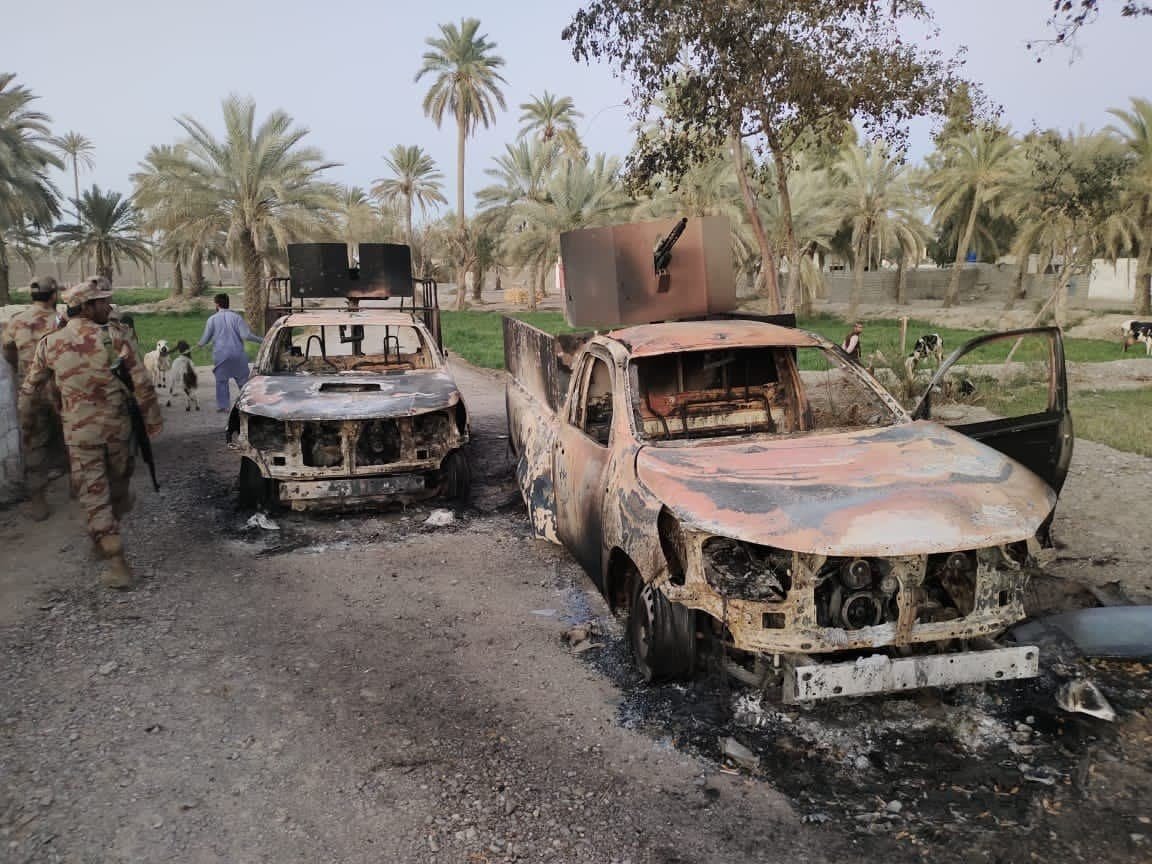People in Balochistan are remembering the martyrs of 2019 Gwadar attack. May 11, was a big success for Balochistan Freedom Fighters. It was a dark day for Pakistan and china security apparatus in the history. On this day in 2019, 4 Balochistan Freedom Fighters heavily armed with automatic weapons stormed the 5 Star Hotel “Pearl Intercontinental” located in port city Gwadar of Balochistan. The Freedom Fighters penetrated inside the hotel building by shooting the guard’s of hotel and started indiscriminate firing on Pakistani and Chinese outsiders present in the hotel for business deals. Among them were Pakistan and Chinese navy and armed forces personnel as well.

The Freedom Fighters seized the hotel floors and took hostage of the Pakistani and Chinese outsiders. The hotel was under heavy firing & fully under the control of the Baloch Freedom Fighters. Clashes between the Balochistan Freedom Fighters and the invader Pakistan army continued for nearly 24 hours. As a result according to Balochistan Liberation Army’s official statement at least 40-45 Pakistani/Chinese engineers, hotel staff and among the armed forces personnel were killed, including the Balochistan Freedom Fighters in hours long operation. But Pakistani and Chinese authorities only confirmed of 8 people dying.
On the same day the media wing of the Balochistan Freedom Fighters Published the photograph’s of its Sarmachar’s (Freedom Fighters) who stormed the hotel and they were Hammal Baloch, Asad Baloch, Munseb Baloch and Kachkol Baloch. All were associated with the special wing of the organization known as “Majeed Brigade” of suicide bomber’s who had decided to become martyred in the path of freedom of their motherland from the invasion by Pakistan and China.

Freedom Fighters also published the video from hilly area where a commander of the organization with his other companions threatens to carry out more such attack’s especially on Chinese engineer’s present in Balochistan, working on CPEC Project. The commander in his video warns china and Pakistan to withdraw immediately from Balochistan as it is the land of Baloch Nation and they are present in Balochistan without the consent of Baloch Nation. He also promises to destroy CPEC on Baloch land.
At the same time, he also says that the “Majeed Brigade” has been formed particularly to attack Chinese officials and its installations in Balochistan. He calls on Chinese President Xi-Jinping to quit from Balochistan and stop its exploitative projects in Balochistan and do not support the genocide Baloch people by the Terrorist Pakistan Army, else china will witness massive retaliation from Baloch Freedom Fighters that the Chinese will never forget. The attack on Pearl Intercontinental Hotel was part of operation “Zer Pahazag” launch against china, he adds.
At last he says, “General Aslam Baloch’s mission will continue”, General Aslam Baloch was the commander of BLA and the founder of “Majeed Brigade”, he was martyred along with six other top commanders of BLA in a suicide attack in Kandhar, Afghanistan on December 25, 2018.
The Pearl Continental is the only luxury hotel in Gwadar, formerly a small fishing village, and is where foreign and Pakistani business delegations as well as diplomats stay when visiting the city.
The hotel sits on a hilltop overlooking the Gwadar port, which is the flagship project of the China-Pakistan Economic Corridor (CPEC), a network of roads, railway and pipelines between China and Pakistan.
Gwadar
Gwadar is situated on the southwestern Arabian Sea coast of Pakistan in Gwadar District of Balochistan province. Like Ormara further east, Gwadar is situated on a natural hammerhead-shaped tombolo peninsula forming two almost perfect, but naturally curved, semicircular bays on either side. The city is situated on a narrow and sandy 12 kilometers long isthmus which connects the Pakistani coast to rocky outcroppings in the Arabian sea known as the Gwadar Promontory, or Koh-e-Batil, which reach an altitude of 480 feet and extends seven miles east to west with a breadth of one mile. The 800 foot wide isthmus upon which Gwadar is located separates the two almost perfect semicircular bays from one another. The western bay is known as the Paddi Zirr, and is generally shallow with an average depth of 12 feet, and a maximum depth of 30 feet. To the east of the isthmus is the deepwater Demi Zirr harbor, where the Gwadar Port was built.
The area north of the city and Gwadar Promentory is flate and generally barren. The white clay Koh-e-Mehdi (also known as Jabal-e-Mehdi) is a notable exception, and rises sharply from the plans to the northeast of Gwadar. The Koh-e-Mehdi features a two discernible peaks, with a height of 1,360 and 1,375 feet, and is approximately 4 miles wide and features sharp cliffs that drop precipitously into the Arabian Sea. Following an earthquake in September 2013 a small island called Zalzala Jazeera (“Earthquake Island”) formed approximately 2 kilometres (1.2 mi) off the coast.
How is Gwadar strategically important for China instead of Pakistan?
Planned investments in Gwadar Port as part of CPEC will improve connectivity to the restive Xinjiang, Uyghur Autonomous Region, thereby increasing the region’s potential to attract public and private investment. The Gwadar Port project will also complement China’s Western Development plan, which includes not only Xinjiang, but also the neighboring regions of Tibet and Qinghai.
In addition to its significance to reduce Chinese dependence on the Sea of Malacca and South China Sea routes, the port of Gwadar will provide China an alternative and shorter route for energy imports from the Middle East, thereby reducing shipping costs and transit times. The currently available sea-route to China is roughly 12,000 kilometres (7,500 mi), while the distance from Gwadar Port to Xinjiang province is approximately 3,000 kilometres (1,900 mi), and another 3,500 kilometres (2,200 mi) from Xinjiang to China’s eastern coast. As a result of the CPEC, Chinese imports and exports to the Middle East, Africa, and Europe would require much shorter shipment times and distances.

This will in turn will also reduce transit times to the Kyrgyzstan and hydrocarbon-rich Kazakhstan through already existing overland routes. The Chinese government has already upgraded the road linking Kashgar to Osh, Kyrgyzstan via the Kyrgyz town of Erkeshtam while a railway between Ürümqi, China and Almaty, Kazakhstan has also been completed as part of China’s One Belt One Road initiative. Numerous land crossings already exist between Kazakhstan and China as well. Additionally, the Chinese government has announced plans to lay railway track from Tashkent, Uzbekistan towards Kyrgyzstan with onwards connections to China and Pakistan’s coast.
How difficult is the Gwadar area for anyone to reach?
Lets discuss how much security Pakistan has setup to protect Gwadar. Also keep in mind if it is possible for Balochistan freedom fighters to cross all these omnipresent physical and procedural security barriers and carry out a remarkable attack on Pakistani and Chinese invaders, just imagine how useless Pakistan Security forces are.
Balochistan is mostly off limits to outsiders and there’s no visible foreign presence beyond the Chinese. Journalists and visitors are closely monitored by Pakistan’s intelligence agencies.
Pakistan Navy assembled a Task Force-88 (TF-88), in December 2016, for the seaward security of Gwadar Port and protection of associated sea lanes on 13-December 2016, exclusively for maritime security of Gwadar port. Task force is equipped and financed by China. Pakistan has outsourced its national security, particularly in the Indian Ocean, by integrating it with that of China. Pakistan hallucinates that China will be compelled to act to protect their ships, equipment and personnel stationed at Gwadar in an event of conflict with India.

TF-88 comprise of ships, fast attack craft, aircraft, drones (unmanned aerial vehicles), and surveillance assets. Additionally, marines are deployed at sea and around Gwadar for security operations. Pakistan also negotiated with China the purchase of eight Type 41 Yuan-class diesel-powered, conventionally armed attack submarines. Half of these submarines will be built in Pakistan while the other half are being made in China and will be transferred later to Pakistan. This acquisition, which is reportedly part of the CPEC package, would be one of Pakistan’s biggest weapons purchases ever, at about $6 billion.
Bankrupt Pakistan which doesn’t have food to give to its citizens is spending $6 Billion only on the 8 submarines.
Pakistan Navy also has increasing security at Gwadar port, conducting security patrols and coastal exercises, enhancing maritime domain awareness and engaging law enforcement agencies. It is reportedly considering buying super-fast ships from China and Turkey for its special squadron to be deployed for the security of Gwadar port.
The Special Security Division (SSD) is a new 2-star Pakistan Army-led command, raised in September 2016 as a response to major concerns over how to protect the China-Pakistan Economic Corridor (CPEC) and its workforce from serious internal and external threats.
SSD consists of 15,000 personnel organised into nine army infantry battalions and six paramilitary wings (from the Pakistan Rangers and the Frontier Corps), the latter funded by the Interior Ministry. The SSD is the land-based counterpart to CPEC’s maritime security command, Task-Force 88.
The Pakistani military is also in the process of raising a division headquarters of the 44 Light Infantry in Balochistan’s Gwadar.
“The new headquarters is to ensure smooth security measures and proper coordination,” a source said. “Pakistan knows that any attack on Chinese investments will have serious ramifications for the country, especially the military that benefits the most out of this project.”
An article Gwadar, security & inclusive development gives an idea about the security arrangements in Gwadar.
The journey from the exit out of the Gwadar Airport to the narrow passage through the old town – barely half a kilometre stretch – to the security checkpoints before the Port Area and on the way to the Kohe Batil is not amusing at all.
The first thing that strikes a maiden visitor to the area during this 10-kilometre trip is the narrow entry-exit gate; all the vehicles on the way out have to meander through a dirt patch if the way is blocked by incoming traffic – a sad reflection indeed on the competence of the authorities.
Equally striking is the presence of about two dozen armed soldiers and their vehicles near and around the gate of the airport. The sight of this imposing presence of armed forces itself is a turn-off, in fact intimidating, particularly for foreign visitors who are not used to such scenes.
Next, the security checkpoint before the Port Area itself is often quite testing not only for Pakistani visitors but also even for locals because of discomforting questions by the young soldiers manning the posts. They clearly lack the knowledge of local sensitivities. Nor are they equipped with the ability to distinguish between potential militants and visitors – most of whom travel in the official vehicle of the only hotel that is perched on the Kohe Batil.
And these factors often breed frustration among locals as well as give way to all kind of suspicion and speculation. Ashraf Hussain, for instance, is a local politician and big name in the real estate because of ancestral lands his family has owned. He is mostly reluctant in coming to the PC Hotel on Kohe Batil because of questions ( in his words “insults”) that he some times has to face at the hands of soldiers at piquets.
Punjabi dominated Pakistan does not trust the local Baloch population. As a result most locals feel being treated as terror suspects. The share of jobs for local Baloch people in provincial institutions such as GDA or the Port Authority is minimal. Most of the contracts are gradually being doled out to Punjabi outsiders from Karachi and Lahore, which means elbowing out local Baloch population and condemn them to live in poverty and destitue while taking over their lands at cheap prices without any suitable compensation.
Due to the continuous burning of baloch villages, enforced disappearance of Baloch locals for organ harvesting or killed by death squads and SSD, locals do not venture in the area near the Gwadar. Native Baloch if trying to cross the area can be spotted from a distance.
“It doesn’t feel like a normal investment location or an enabling business environment if that level of protection needs to be provided,” said Andrew Small, who has written a book on Pakistan-China relations and is one of a handful of westerns to have traveled to Gwadar.
As we mentioned earlier the purpose of discussing the security in and around Gwadar port was to show how difficult is for anyone to cross these omnipresent physical and procedural security barriers and carry out a remarkable attack on Pakistani and Chinese invaders, just imagine how useless Pakistan Security forces are.
Points to Ponder
1. Gwadar Attack was a reality check moment for Pakistan. The ease with which Gwadar was attacked by the Baloch should make Pakistan question itself whether it is capable of holding Balochistan.
2. Gwadar Attack shows both the desperation as well as organization of Baloch Resistance Movement. And with such a level of ground support, It’s but natural for one to ask why the Baloch are not ready for Pakistani rule. This, all the more, asserts the importance of a global fact finding mission with the area transferred to under UNPKF from Pakistani Army to establish a level of neutrality.
3. The Murders of exiled Baloch leaders should be thoroughly investigated, and so are the rumors of concentration camps and body harvesting units. Not investigating them will only tilt the popular opinion further against Pakistan.
4. The first thing Pakistan should do is to bring all the stake holders into talks at a neutral location to understand their grievances and needs. It’s time Pakistan sees this as a freedom movement and not a terrorist act. Contrastingly, Kashmir is not a freedom movement simply because the ground assets carry out their training, not in Kashmir but in Pakistan. In other words, Pakistan shouldn’t see Balochistan from the prism of Kashmir – a politically opportune and economically profitable venture.
Read our related article: Pakistan Purposely Spreading ChineseVirus in Balochistan: Hyrbyair Marri
Follow us at:-
Twitter Handle: @communique_news
Parler Handle: @newscommuniquecom
Subscribe our : YouTube Channel https://www.youtube.com/channel/UCnKJQ3gFsRVWpvdjnntQoAA
Like our Facebook Page https://m.facebook.com/News-Communiquecom-103788531007438/
6,243 total views








